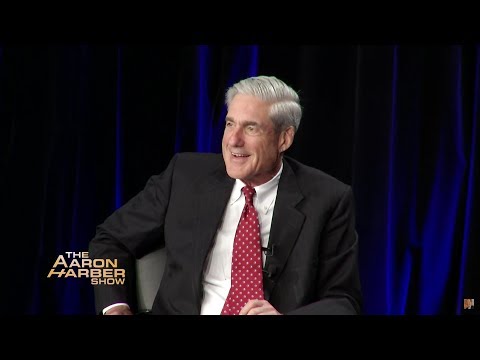Why a Three-Year-Old Interview with Robert Mueller Is More Important Than Today’s Breaking News

(Editor's note: Kent Harrington, a former senior CIA analyst, served as National Intelligence Officer for East Asia, Chief of Station in Asia and the CIA's Director of Public Affairs.) President Trump’s attack on his own government, his predecessors and the United States as he stood beside Vladimir Putin in Helsinki on Monday amply criticized the special counsel’s probe into Russian interference in the 2016 election and Moscow’s possible collusion with the Trump campaign. In 2015 Aaron Harber interviewed Robert Mueller, the special counsel, exploring his history, experience, ethics and integrity as well as his views. News executives should take time to watch Harber’s just distributed work. It’s the kind of quality interview their viewers should see, and aren’t getting from their networks, when the country needs it most. (Watch the full interview at the link or in the video at top.)
The importance of the three-year-old, 90-minute discussion obviously isn't about "the get," the TV news term of art connoting success when a sought-after newsmaker comes on air. News executives would sell their first-born if they could get Mueller on their shows. When Harber recorded their talk, Mueller was a private citizen, not the special counsel investigating Russia's interference in the 2016 election. Today, Mueller doesn't give interviews. It isn't something news producers can do anything about.
Rather, the previously unreleased one-on-one with the former FBI director makes a much more important point: Its what broadcast journalism should strive to do. A radio and television news veteran, Harber specializes in long-form interviews. His approach is non-partisan with in-depth questions that give guests ample room to argue, not just summarize their views. The contrast with the national news shows -- the invitees' cyborg-like repetition of single-syllable talking points, the anchors' constant interruptions and the endlessly mediocre expert analysis -- is obvious. So, too, is what the prevailing shallow, copycat formats now dominating broadcast journalism fail to deliver to their viewers.
Harber's interview with Mueller isn't about entertainment. While the two-person discussion on stage works well for the first hour, the audience's questions -- the Denver forum drew students and law enforcement officers, among others -- wander after that. Rather, Harber's skill gives viewers an intimate view of Mueller, not only as a professional and a leader but also as a human being. Unlike the fate of high profile guests on national news -- the "gotcha" interrogations of partisan commentators, the nightly repetitive questioning by star reporters about that day's so-called "breaking news" and the often instant segue from the substance to the politics of the guests' remarks -- Harber does something profoundly effective. He allows Mueller to talk about issues in all their complexity in his own terms.
Why is that important? Take what Mueller said about his approach to his FBI duties, which he happened to assume just a few days before September 11th, and his current job as special counsel. Already an accomplished U.S. Attorney and Deputy Attorney General before his appointment, Mueller talked at length about his learning curve as well as his reforms at the Bureau as its priority shifted from investigating crimes to preventing terrorist attacks. From his Oval Office anecdotes to admissions of his own management missteps, the three-year-old self- portrait couldn't be more revealing for anyone who wants to understand the special counsel who is examining Russia's attack on American democracy and the possible collusion of a presidential campaign. Thanks to Harber, nothing could say more about the man and his qualities than to allow him to describe what forged his actions when he faced an equally daunting challenge almost two decades ago.
Harber's long-form interview offered something else that also speaks to Mueller's current role: a discussion of public service and its values that rarely if ever finds its way into the news broadcasts on Fox, NBC, CNN or any other national news. A decorated Marine officer, federal prosecutor, Justice Department official and FBI director, Mueller couldn't be a better explainer. To his credit, Harber lets him reflect at length. In the end, Mueller puts the values proposition succinctly. "Public service gives you the chance to get up every morning … and get to do what's right," he says. "It's a freedom that's hard to come by."
The White House would be well advised to read the line more than once.
As a counterpoint to the faux urgency, paid commentators and partisan pissing contests that pass as prime time news, Harber's interview has done credit to journalism. He's reminded us that even a three-year-old discussion of the issues can go to the heart of today's news. Attacked by the president, pilloried by a Republican Party desperate to discredit his work and vilified by right wing media carrying its water, Mueller is a figure deserving of just such straight-forward reportorial attention. He's not the only one, nor are his responsibilities the only subjects on which a dose of Aaron Harber's style of journalism is long overdue.
Click here to read more by Kent Harrington.
What's Next After Singapore? Ask TV Critics, Not the Foreign Policy Experts
Why the News Needs to Deconstruct Trump's Dangerous Jingoism
It's Time Social Media Got Serious About National Security
Click the social buttons above or below to share this story with your friends and colleagues.
The opinions and points of view expressed in this content are exclusively the views of the author and/or subject(s) and do not necessarily represent the views of MediaVillage.com/MyersBizNet, Inc. management or associated writers.


